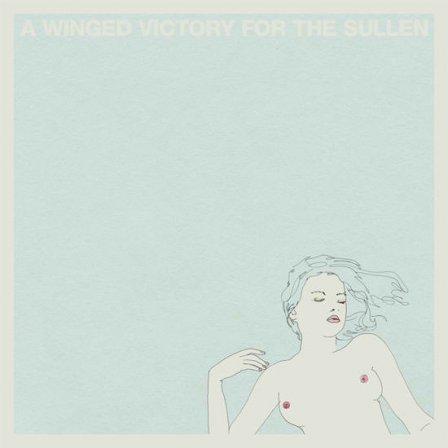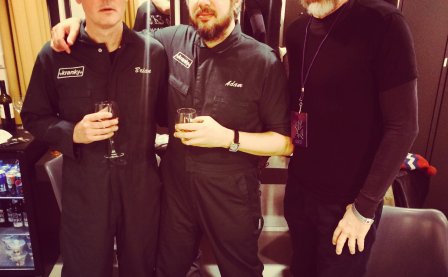A Winged Victory for the Sullen was born from a chance encounter between Adam Wiltzie (Stars of the Lid, etc.) and Dustin O’Halloran (Dévics). They were introduced, in 2007, by their mutual friend, Francesco Donadello, during what would become Sparklehorse’s final European tour. Backstage, they developed an instant rapport and subsequently, across the Continent (Belgium, Germany, Italy), formed a collaborative friendship. In the meantime, both artists continued working on other projects: alone, 2011 has delivered both O’Halloran’s Lumière and sleepingdog’s With Our Head in the Clouds and Our Hearts in the Field, the second collaborative effort between Chantal Acda and Wiltzie. However, A Winged Victory for the Sullen fell into a singular focus, rising from long conversations, a series of sketches, and shared visions, and conformed to the weight of death and two dissolving marriages. (“It was a heavy time for us both.”) Additionally, they invited the prolific multi-instrumentalist Peter Broderick and the Icelandic cellist Hildur Guðnadóttir to perform on the album. Together, they created A Winged Victory for the Sullen. “[We] wanted to name it something with sort of a grand feeling.” They patched together, in part, a name from the ruined remains of an antiquated victory and claimed it as their own.
Both composers, in addition to their named collaborators, exist within a network of contemporary, independent “post-classical” musicians still seeking proper definition. Their voices, not dissimilar, continue to fight their way through derivation, predictability, and forgettability — and often succeed. Typically relying upon lush ambience, romantic phrases, conventional melodies, and palpable emotion, it’s difficult to find a work among theirs that is not openly attractive. And so because they are among the least hostile artists working today, they are also among the least challenging — even as I often return to them.
But of what use is this music? Mere beauty? Adorno bemoaned the music playing in the background of cafes, the “bouquets of dead flowers” arranged in the simple, recognizable “best-loved-melodies” of the past, which awaken, in our recognition of them, as playing, “the ruins to new, ghostly life.” I see and hear the influences, here, in A Winged Victory for the Sullen: Chopin and Satie, the delicate piano compositions of Part, the minimalism of Górecki and Bryars, and music for film. They trace their lineage from the domesticated avant-garde (or a “wallpaper music,” as they refer to it) and compose, in an already too familiar aesthetic of austerity, the background music of a recessional time. Yes, Wiltize and O’Halloran have been doing it (well/beautifully) for years in their respective projects and with their respective collaborators. But in a time of intense, increasing lack and loss, and in the shadow of the musicians’ own experiences (of absence and dissolution), I’m curious if an aesthetic of austerity can become something other than background music or perhaps a form of counter-austerity against our own crises? (The small label, Slaapwel, which features the most ambien(t) work of Broderick, among others, was formed around the idea of releasing albums that might aide those with barriers to sleeping. This, beyond kindness and under the exhausting weight of our economic disorder, seems inadvertently political.) Does an austere beauty respond to a ruinous ideology of austerity? Or does it merely provide a forgettable soundtrack to our loss — already gone after a flick of the switch? (Spoiler: I don’t have an answer.)
And yet, A Winged Victory for the Sullen is a thorough and deeply felt music. The album consists of seven songs that play, in total, for 45 minutes. Titles utilize the language of classical forms and referents (a minuet, a requiem, a symphony pathétique) and images of mourning and melancholia (a pain felt through anesthetics, the suicide of Mark Linkous, the always-sudden departure). Although not a hybrid work, A Winged Victory for the Sullen strikes me as the perfect bridge between the the ambient dronescapes of Wiltzie’s previous work and the post-classical sketches of O’Halloran. However minimal the compositions may be, they are meticulous and natural, mature and utterly articulate. The album, predictably, is made of common parts: delicate piano phrases (of the self-taught pianist), minimal orchestration, quiet drones, and tasteful sampling (the final song carries the album out, up into the sounds of distant fireworks). There is an astounding simplicity to the phrases themselves, and the performances are beautifully executed. Relying less on maximalist drama or meandering ambience, A Winged Victory for the Sullen caries itself out, naturally and methodically, into recognizable movements of song. And fortunately, although working within a minimal aesthetic, neither composer reverts explicitly to the Glassian/Reichian repetitions that many contemporary artists use as a crutch, or worse. In fact, more so than either Wiltzie’s or O’Halloran’s previous work, there is a clear movement within and throughout the album, and an internal logic that leaves me in a quiet awe.
Listening, finally, I’m caught up in my own associations and shared experiences. Wiltzie and O’Halloran claim that each song refers back to an individual, while only naming one, Mark Linkous, in memoriam. Indeed, from what we know and has been stated, the album was composed in the midst of losing and in the remains of loss. But what strikes me is the absence of explicit darkness. Throughout the album, there is an elegiac hope, a pained consolation, a holding (as in the im/mortal words of Paul Celan, “Die Welt is fort, ich muss dich tragen”). Never elevating into manipulative crescendo or descending into despair or cynicism, A Winged Victory for the Sullen is finally a subtle, profound (and profoundly mature) work of mourning and redemption. Composed by two musicians at the height of their craft, the album reveals itself, thus far, as the apex of a limited genre still forming and as one of our finest contemporary acts of remembrance and ascension.
More about: A Winged Victory for the Sullen




